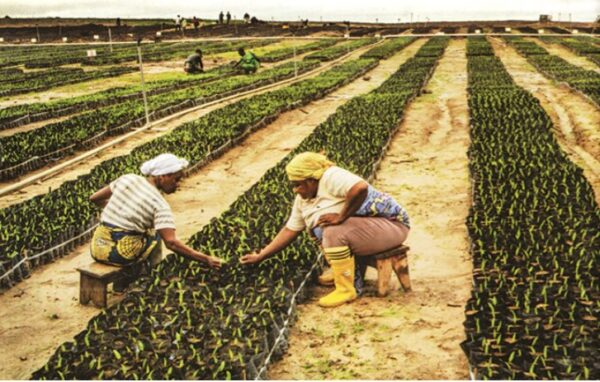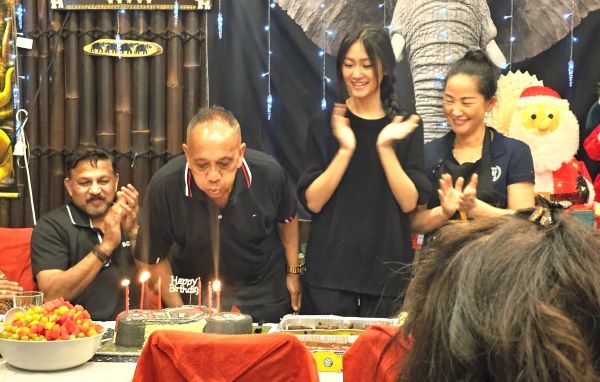Why Sri Lanka’s export basket should take a welcome tilt to Oil Palm-By Steve A. Morrell

Source:Island
The National Geographic Magazine in their publication of December 2018, had a lot to say about the benefits of oil palm.
‘The abundant oil from the fruit of oil palm can be found under different ingredient names in everything from cookies to soap to lipstick. A natural alternative to trans fats. It provides many other benefits. It is cheap to produce, stable in processing, and slow to smoke it has a long shelf life’
The African oil palm, a native to Africa has been introduced all over the world. The tree is an oil producing machine with some 20 fruit bunches found at the top of its trunk each containing up to 3000 palm fruit.
Late Ranjan Wijeratne, when he was chairman of Sri Lanka State Plantations Corporation ( SLSPC) introduced and promoted planting oil palm in the wet zone areas and in plantations in the South. Land topography, and weather conditions were ideally suited to propagate the crop. He selected a few estates to introduce the crop, Nakiyadeniya Estate, was one of them. He was on record to inspire the Plantation industry that oil palm was beneficial to the country and considering its many uses was a product of the future.
Following detailed expert study that the water table would not be affected, and low lying plantation areas were suited for the crop, he embarked on its propagation.
Professor Asoka Nugawela, Department of Plantation Management Faculty of Agriculture, and Plantation Management, Wayamba University of Sri Lanka, said Palm oil is rapidly the world’s most widely used vegetable oil. He confirms beneficial findings by Hilary Rosner, author of the National Geographic story, that palm oil is found in a vast range of products from confectioneries and baked goods, to cereals, washing powders cosmetics, and even first generation bio fuels.
Indonesia is the largest producer of palm oil. However, smaller nations like Sri Lanka now have an unprecedented opportunity to offer valuable alternatives to international markets in the form of sustainably cultivated oil palm.
Quite in contrast to the ‘slash and burn’, policy of nations like Borneo, and Indonesia, where admittedly its harmful repercussions were experienced to the fauna and flora of these areas, and also the decimation of wild life, plantations areas identified by Ranjan Wijeratne were un profitable rubber lands, that did not need decimation or environmental damage to establish the crop.
Due to his farsighted policy to establish the crop, his efforts have now resulted in plantation areas successfully established about 11,000 hectares in southern plantation lands.
Those lands situated in the wet zone areas of the South, did not damage the water table; and were not environmentally damaging. It is also of relevance that arable rubber lands were not destroyed to accommodate oil palm.
Travelling to Galle on the highway, we have observed small holders, too established some land space to oil palm, which should be encouraged,
This was confirmed by Professor Nugawela. He is reported to have said the government’s stated aim for cultivating 20,000 hectares of oil palm would auger well from the perspective of the progressive future for the domestic economy.
Sri Lanka’s annual edible oil requirement is 160,000 metric Tonnes (MT). conversely the country produces a total of 53,000 MT for example coconut oil, and other oils, leaving a deficit of 89,000 MT of edible oils. The actual, oil requirement could be much higher, he said.
He further said, ‘ While these dynamics present notable challenges to the Sri Lankan economy particularly in terms of the depletion of foreign exchange, they also speak to vast untapped potential for import substitution and export development. In 2015,Sri Lanka spent Rs.20.8 Billion on oil and fats imports with a significant majority of those imports being for oil palm. Collectively, palm kernel, palm oil, palm stearin, and crude palm oil, accounted for 164,835 MT or nearly 30 percent of all edible oil and fats imported to Sri Lanka.
The competing oils are soya bean, canola, sunflower Additionally, of course, Coconut oil.
Import substitution is one aspect for its benefits, but of greater relevance is its export potential and above all comparatively minimal cost.
Our readings have revealed the crop is native to African countries, For example Benin, and Gabon. However it is of consequence that Sri Lanka too could add to its export product and reap such benefits which in the current context of things, the economy looks to the plantations to sustain the economy.
Profits earned could benefit the worker population for social welfare development, ensuring more comfortable circumstances for the workers on estates.
As was established by the Plantation Trust, an organization established by the Dutch Government, under an aid programme, workers could be ensured good living circumstances.
Palm oil uses far less in cultivable extents but with far greater profit margins. Coconut, with a cost of production (COP) of Rs.15. per nut, and an net sales average (NSA) of Rs, 40. Coconut produces yields per hect, of 7000, nuts, but, Oil Palm produces 18,000 kg, per hectare.
Similarly Tea and rubber are costly to produce. In comparison oil palm costs far less..
Professor Nugawela’s findings need serious consideration for export potential of the oil palm industry and its future as a valuable foreign exchange earner.




















